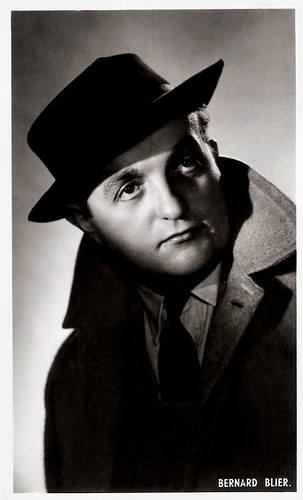
French collectors card, no. A 56.

French postcard by Editions P.I., Paris, presented by Les carbones Korès 'Carboplane', no. 189. Photo: Carlet.
Cuckolded husbands
Bernard Blier was born in 1916 in Buenos Aires, Argentina, where his father, Jules Blier, a biologist at the Pasteur Institute, was posted at the time. Blier hated school and began taking drama lessons when he was 15.
On the fourth attempt, he was admitted to the Paris Conservatoire, a leading drama school, in 1937. That year, he also made one of his first film appearances as a ‘young man on a tandem’ in the comedy Gribouille/Heart of Paris (Marc Allégret, 1937), based on a story by Marcel Achard. The film stars Raimu and Michèle Morgan in her first major film role.
Bigger roles followed in the classics Hôtel du Nord (Marcel Carné, 1938) starring Annabella, and Le Jour se lève/Daybreak (Marcel Carné, 1939) with Jean Gabin, which is considered one of the principal examples of the French poetic realism. His rotund features and premature baldness allowed him to often play cuckolded husbands in his early career.
At the start of the Second World War, Blier enlisted in the French infantry but was captured and interned in a prisoner-of-war camp in Austria, where he lost 27 pounds in weight. During the war years, his films included the comedy-drama Le Pavillon brûle/The Pavilion Burns (Jacques de Baroncelli, 1941), starring Pierre Renoir and Jean Marais, and the fantasy film La Nuit fantastique/The Fantastic Night (Marcel L'Herbier, 1942), which was one of the most successful films made in France during the German occupation. It starred Micheline Presle and Fernand Gravey.
After the war, he returned to the screen in French classics like the drama Dédée d'Anvers (Yves Allégret, 1948), featuring Simone Signoret, and the police procedural drama Quai des Orfèvres/Quay of the Goldsmiths (Henri-Georges Clouzot, 1947) with Suzy Delair, Louis Jouvet and Simone Renant. The films were popular with both audiences and critics. James Travers at French Films about Dédée d’Anvers: "Blier, as ever, makes the most of what he is given and works particularly well alongside Signoret - so well in fact that he would star opposite her in Allégret's next film but one, Manèges (1950)."
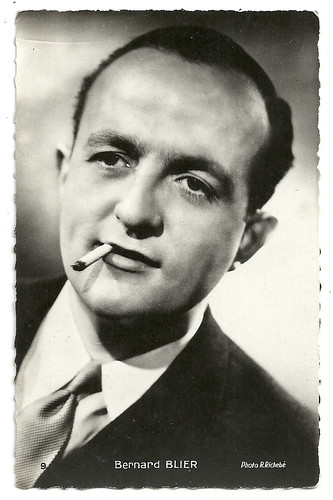
French postcard by Editions Chantal, Rueil, no. 9. Photo R. Richebé.
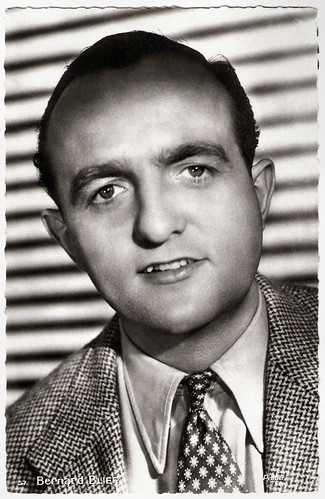
French postcard, no. 57. Photo: Pathé.
Versatile and sought-after
During the 1950s and 1960s, Bernard Blier proved to be one of France's most versatile and sought-after character actors, performing interchangeably in comedies and dramas. His films included Avant le déluge/Before the Deluge (André Cayatte, 1954), the comedy-thriller L'Homme à l'imperméable/The Man in the Raincoat (Julien Duvivier, 1957) starring Fernandel, and he played Javert in Les Misérables (Jean-Paul Le Chanois, 1958) with Jean Gabin as Jean Valjean.
He often appeared in Italian films too. An example is La grande guerra/The Great War (Mario Monicelli, 1959) about an odd couple of army buddies (Alberto Sordi and Vittorio Gassman) in World War I, who experience the horrors and grimness of trench warfare. The film won the Golden Lion at the Venice Film Festival and was an Academy Award nominee as Best Foreign Film.
Also interesting was the Italian drama Il gobbo/The Hunchback of Rome (Carlo Lizzani, 1960), loosely based on the real-life events of Giuseppe Albano (played by Gérard Blain), one of the protagonists of the Roman Resistance against German occupation.
Blier also appeared with Lino Ventura in the crime comedy Les tontons flingueurs/Monsieur Gangster (Georges Lautner, 1963) and opposite Jean-Paul Belmondo in the French-Italian adventure film Cent mille dollars au soleil/Greed in the Sun (Henri Verneuil, 1964), which was entered into the 1964 Cannes Film Festival. A huge popular success was the French comedy thriller The Big Restaurant/Le Grand Restaurant (Jacques Besnard, 1966), starring Louis de Funès and Blier.
More prestigious was Lo straniero/The Stranger (Luchino Visconti, 1967), based on Albert Camus' novel L'Étranger. Hal Erickson at AllMovie: “The Stranger is a literal (but still very cinematic) adaptation of the novel by Albert Camus. Marcello Mastroianni stars as Meursault, a man who feels utterly isolated from everyone and everything around him. This alienation results in sudden, inexplicable bursts of violence, culminating in murder. The subsequent trial of Meursault manages to convey the oppressive heat of its Algerian setting with director Luchino Visconti's usual veneer of elegant decadence.”
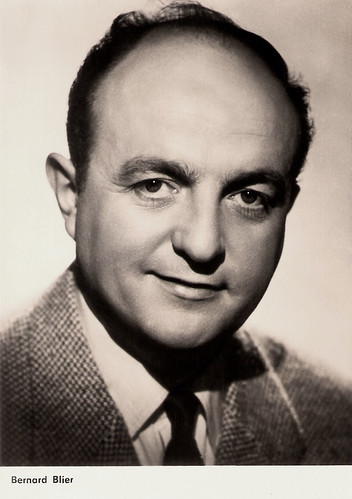
East-German postcard by VEB Progress Filmvertrieb, no. 3247, 1968. Retail price: 0,20 M. Photo: Unifrance.
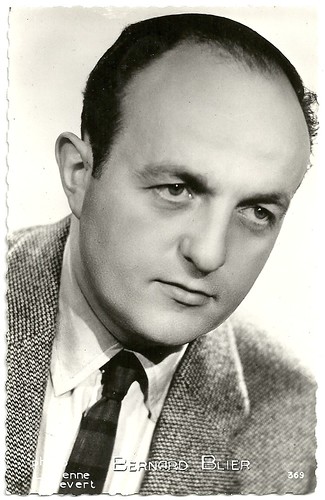
French postcard by Editions P.I., Paris, no. 369. Offered by Les Carbones Korès. Photo Lucienne Chevert.
Box-office hits and major directors
Bernard Blier also played in the popular comedy Le Grand Blond avec une chaussure noire/The Tall Blond Man with One Black Shoe (Yves Robert, 1972), co-starring with Pierre Richard and Jean Rochefort. The film led to both a sequel, Le Retour du Grand Blond (Yves Robert, 1974) and the Hollywood remake The Man with One Red Shoe (Stan Dragoti, 1985) starring Tom Hanks.
Another box office hit was the Italian comedy-drama Amici miei/My Friends (Mario Monicelli, 1975). It tells the story of four middle-aged friends (including Ugo Tognazzi and Philippe Noiret) in Florence who organize together idle pranks (called Zingarate, gipsy shenanigans) in a continuous attempt to prolong childhood during their adult life. The film made it to number one at the Italian box office and was followed by two sequels, Amici miei Atto II (Mario Monicelli, 1982), and Amici miei Atto III (Nanni Loy, 1985).
Blier is the father of French screenwriter and film director Bertrand Blier (born 1939). Father and son worked together for the first time on Calmos (Bertrand Blier, 1976). Two men (Jean-Pierre Marielle and Jean Rochefort), worn out by their wives, abandon everything to go and live in the back of beyond. There they meet a truculent priest, a boozer, Émile (Bernard Blier) who recalls them to life's simple pleasures. Their next cooperation, the black comedy Buffet froid (Bertrand Blier, 1979), starring Gérard Depardieu, was not a success at the box office, but later gained a cult status.
During the final years of his life, Blier seemed only to work with major directors. With Luigi Comencini, he worked on the Italian comedy-drama Voltati Eugenio/Eugenio (1980), which entered the 37th Venice International Film Festival. With Ettore Scola, he made Passione d'amore/Passion of Love (1981) which was entered into the 1981 Cannes Film Festival. For Mario Monicelli, he appeared in three films: Le due vite di Mattia Pascal/The Two Lives of Mattia Pascal (1985), Speriamo che sia femmina/Let's Hope It's a Girl (1986) and I picari/The Rogues (1987).
With Andrzej Wajda, he made his final film, the French drama Les Possédés/The Possessed (1988), starring Isabelle Huppert. In 1989, a month before he died, he was awarded an Honorary César (the French Oscar). Bernard Blier died of cancer in 1989 in Saint-Cloud, France. He was married twice. From 1937 to 1965, he was married to Gisèle Brunet, the mother of his son Bertrand. His second wife was Annette Martin, with whom he was married since 1965.
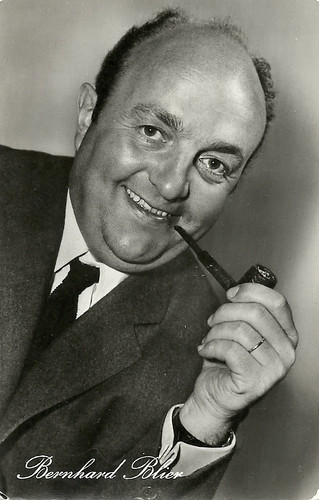
East German postcard by VEB Progress Filmverleih, Berlin, no. 605. Photo: Gerhard Puhlmann. The postcard refers to the Franco-German (Pathé-DEFA) coproduction of Les Misérables (Jean-Paul Le Chanois, 1958) in which Blier played Javert, the antagonist of Jean Valjean (Jean Gabin).
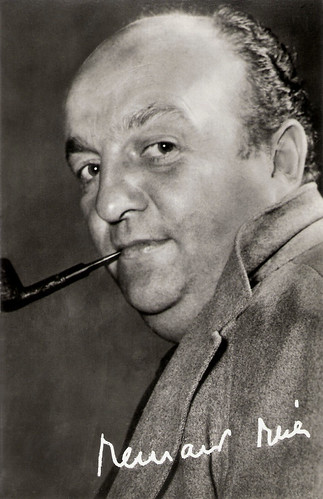
East German postcard by VEB Progress Filmvertrieb, Berlin, no. 428, 1957. Retail price: 0,20 DM. Photo: Gerhard Puhlmann.
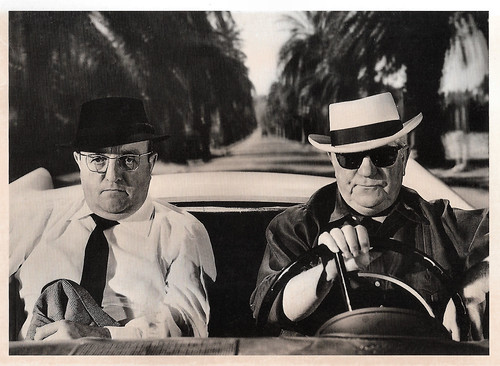
French postcard by Editions Hazan, Paris, 1991, no. 6251. Photo: Bernard Blier and Jean Gabin in Le cave se rebiffe/Money Money Money (Gilles Grangier, 1961).
Sources: James Travers (French Films), Hal Erickson (AllMovie), Wikipedia and IMDb.
This post was last updated on 5 June 2023.
No comments:
Post a Comment